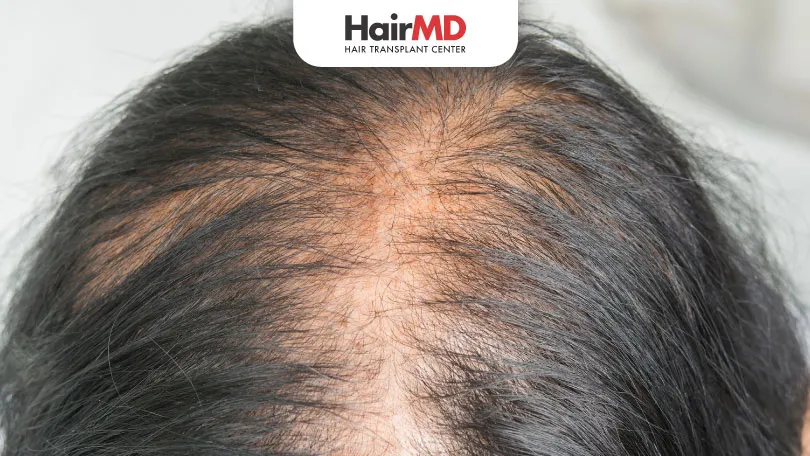25th May, 2022

Does finasteride work for female hair loss? Discover how this medication may help women combat hair thinning, its effectiveness, and potential side effects to consider.
Hair loss in women is very common. About half of the women worldwide suffer from hair shedding, pattern hair loss, etc., in mid-age or earlier. While dermatology has developed several treatment options and medications to tackle female hair loss, much of the curiosity revolves around Finasteride. Even at our clinic, many female patients visit us for consultation on questions like how effective is Finasteride for hair growth, Finasteride dosage for female hair loss, side effects of Finasteride in females, etc. Here’s the answer.
What’s covered in the article?
- What is Finasteride?
- How Effective is Finasteride for Hair Growth in Females?
- Finasteride Dosage for Female Hair Loss
- Side Effects of Finasteride on Females
- Specific and Personalized Consultation on Female Hair Loss Can Help!
- Conclusion
What is Finasteride?
Propecia (Finasteride) is a US FDA-approved oral medication for male pattern baldness. It is a selective 5-alpha reductase inhibitor that reduces the conversion of testosterone into the hormone dihydrotestosterone (DHT).
The most common cause of baldness is androgenetic alopecia, a condition that affects both men and women. While researchers haven’t been able to unearth the exact reason for it, they believe that it involves a sensitivity of hair follicles to dihydrotestosterone (DHT) as it begins after puberty when hormones peak and is observed to be genetically inherited in families. For those suffering from pattern baldness, DHT makes the hair follicles shrink and weaken resulting in hair loss.
Now, how does Finasteride work? It slows down the body’s conversion of testosterone to dihydrotestosterone. Reduced DHT levels help curb hair loss and increase hair density.
How Effective is Finasteride for Hair Growth in Females?
There’s little research that supports Finasteride’s role in reducing female hair loss and increasing hair growth. A study on a few postmenopausal women revealed that Finasteride resulted in significant improvement in more than half the women, moderate growth in a little less than one-third, and no improvement in 15-16 percent of them. But in another study, as much as 80-82 percent of women experienced appreciable results concerning hair thickness after consuming Finasteride for three years.
Despite these studies, one cannot generalize the effect of Finasteride dosage on female hair loss. Everybody’s response to medications are unique. Hence, before choosing Finasteride, a specific dermatologist’s advice is highly recommended.
Finasteride Dosage for Female Hair Loss
Finasteride isn’t approved for female hair loss but used worldwide as off-label indication. In males it is given at doses of daily 1 mg usually. In females, it is given at doses of 1.25mg to 5mg daily. But again, it requires a dermatologist to diagnose and prescribe the right amount of Finasteride, if it is suitable in your case.
Side Effects of Finasteride on Females
The use of Finasteride in females has been linked with various side effects. Some include dizziness, low libido, headaches, breast tenderness, menstrual irregularities, dry skin, etc.
Specific and Personalized Consultation on Female Hair Loss Can Help!
It could be tempting to use over-the-counter medications based on a layperson’s advice and observation. But one must avoid them, especially if they aren’t approved. While hair is one aspect, consuming a medicine without expert advice can cause overall health issues, further complicating the case.
The best way is to visit experienced dermatologists at HairMD and get your female hair loss treated. In addition to diagnosing your case and prescribing the appropriate treatment, our dermatologists will answer all your questions about the suitability of Finasteride dosage for female hair loss.
Do You Know?
Nearly 250 Patients Visit HairMD
Everyday For Various Hair Concerns?
(You are one click away from flawless skin)
Meet Our Dermatologists
Conclusion
In summary, while finasteride shows promise in treating female hair loss, its use remains off-label and may not be suitable for all women. It’s essential to consult a healthcare professional before starting treatment to discuss potential benefits, risks, and alternative options. Managing hair loss often requires a personalized approach, combining medications, lifestyle changes, and proper hair care.
Further Reading
Hair Loss – Could It Be a Sign of a Bigger Health Problem?
Find effective hair regrowth treatments for women. Explore solutions like PRP, medications, and more to combat hair loss with expert advice from HairMD.
Do Hats or Helmets Cause Hair Loss?
Discover the truth about Helmets Cause Hair Loss. Learn how improper helmet use & effective tips to maintain healthy hair with HairMD can affect hair health.
Top Hair Growth Treatments for Women: Your Ultimate Guide
Find effective hair regrowth treatments for women. Explore solutions like PRP, medications, and more to combat hair loss with expert advice from HairMD.
Itchy Scalp and Hair Loss: Causes, Treatments, and Prevention
Itchy scalp and hair loss can be troubling, hinting at deeper scalp and hair health issues. Discover the connection in this comprehensive guide.
Have thoughts? Please let us know
We are committed not only to treating you, but also educating you.











